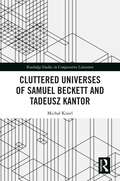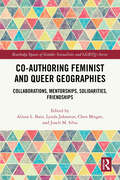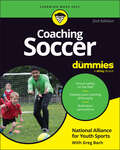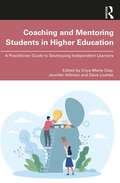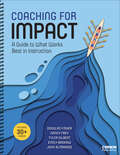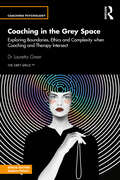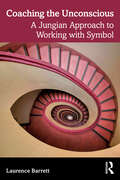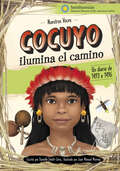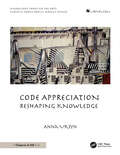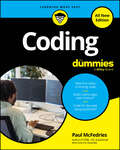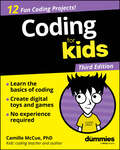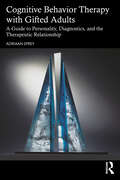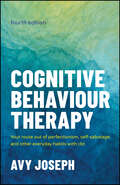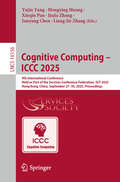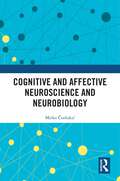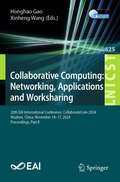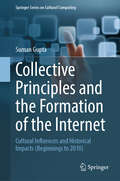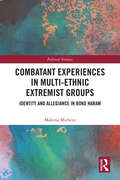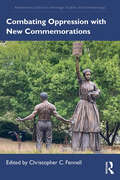- Table View
- List View
Cluttered Universes of Samuel Beckett and Tadeusz Kantor (Routledge Studies in Comparative Literature)
by Michał KisielCluttered Universes of Samuel Beckett and Tadeusz Kantor is a collection of four essays bringing Kantor’s and Beckett’s texts, theatres, and theories into conversation with deconstruction, new materialism, environmental humanities, and posthumanism. This book is dedicated to two artists rarely discussed together to see how their awareness of poetics and performativity of matter might help us understand our connection to the material world, even if the world is falling apart. Jane Bennett, Karen Barad, Rosi Braidotti, Donna Haraway, Timothy Morton, and others pave the way for new critical interpretations of canonical works, which are recognised as universes “cluttered” with matter, objects, things, and other nonhuman visitors of seemingly exclusive human domains. Kisiel shows that Beckett’s and Kantor’s carefulness and care for imagining nonhuman/human relationships might refresh our understanding of memory, togetherness, death, or even the end of the world for the Anthropocene.
Co-authoring Feminist and Queer Geographies: Collaborations, Mentorships, Solidarities, Friendships (Routledge Spaces of Gender, Sexualities and LGBTQ+ Series)
by Alison L. Bain Lynda Johnston Chen Misgav Joseli M. SilvaThe book explores co-authored dynamics of collective knowledge production in feminist and queer geographies. It examines how to use co-authorship as a generative feminist practice of care, endurance, and institutional transformation in support of feminism’s next generation of intellectual communities.This book reveals the auto-biographical back-stories and emotional registers of geographical knowledge production through the co-written chapter intimacies of letters, poetry, interviews, and conversations. In doing so, it demonstrates the care-full and hope-full power of collaborations, mentorships, solidarities, and friendships to not only sustain lives and careers but also to enable social change. It confronts neoliberal reification of individual scholarship as the celebrated metric of academic productivity and presents co-authorship as a practice and politics of generating hope through the dynamics of collective care that its collaborations, mentorships, solidarities, and friendships manifest and sustain.This is an interdisciplinary book at the interstices of Geography, Anthropology, Cultural Studies, Education, Sociology, Women’s and Gender Studies, and LGBTQ+ Studies. Its intended audiences are scholars of pedagogy, feminist and queer theory, and sexual and gender minority life. It targets upper-level undergraduates, graduate students, researchers, writers, and educators.
Coaching Soccer For Dummies
by National Alliance for Youth Sports Greg BachBecome an unforgettable soccer coach for kids of any age, with this complete guide Coaching Soccer For Dummies is a quick and easy reference guide for anyone who wants to start coaching youth soccer—or start coaching better. Help kids 5 and older to improve their skills, work together, and have fun, no matter their experience level. You'll get a refresher on the rules of soccer, with tips on how to teach them to different age groups. Plus, you'll find drills and dynamic exercises you can use to improve the outcomes of your practice sessions. The title “Coach” comes with the responsibility to help players stay motivated and safe, all while building a respectful team culture and supporting kids' mental health. With Coaching Soccer For Dummies it's simple to do all that—and to develop a coaching philosophy that will help you give young players the support they need. Learn drills and techniques for teaching soccer skills to kids of all ages Get a complete rundown on safety, including proper form for injury prevention Establish a positive team culture, prevent bullying, and keep players motivated Communicate effectively with parents and other coaches This book is the perfect choice for beginner or novice youth soccer coaches who are seeking guidance to help improve and develop their coaching skills.
Coaching and Mentoring Students in Higher Education: A Practitioner Guide to Developing Independent Learners
by Jennifer Hillman Dave Lochtie Enya-Marie ClayCoaching and Mentoring Students in Higher Education provides student support and learning development professionals with a comprehensive, evidence-based guide for delivering coaching and mentoring interventions with students.Focused on the context of higher education, it shares practitioner and research insights from a range of coaching and mentoring programmes and considers their transferability to the international higher education sector. It is a collection of practitioner research based on literature reviews, qualitative and quantitative evaluation of student feedback and scenario case studies. Each chapter offers practical tips and recommendations for colleagues in the sector looking to implement coaching and mentoring as a mode of support. Inviting readers to reflect upon their learning at key stages throughout the book, it addresses many key issues for higher education providers – including student engagement, retention and mental health and wellbeing.This essential volume contributes to the growing body of scholarship looking at coaching and mentoring support at university and the impact on retention and student outcomes, and is key reading for senior leaders, strategic managers and student-facing staff alike.
Coaching for Impact: A Guide to What Works Best in Instruction
by Douglas Fisher Nancy Frey John T. Almarode Tyler Gilbert Emily BrokawBuild a sustainable coaching model that drives growth and results Instructional coaching has long been a crucial component of professional development in schools. However, without a clear framework, its true potential often goes unrealized. Coaching for Impact bridges this gap by providing a research-supported, practical guide that enhances the effectiveness of coaching programs while helping coaches transform theory into measurable results. Centered around an innovative set of "Impact Rubrics," this comprehensive flipbook offers a structured pathway for elevating coaching practices. Whether you’re an experienced instructional coach or just beginning your journey, this book equips you with actionable tools, proven strategies, and a vision to foster teacher learning and maximize student success. Inside you’ll find: Impact Rubrics, frameworks in each chapter to make coaching visible, actionable, and aligned with teacher growth and student outcomes Step-by-step guidance for building relationships, collecting evidence, and creating goal-oriented coaching plans Research-driven content highlighting how coaching supports effective teaching and sustainable learning practices A holistic approach with strategies to develop trust, foster communication, and align coaching with broader district and school goals By using Coaching for Impact, coaches will gain the skills to cultivate sustainable coaching models that promote both teacher and student success. If you’re ready to sharpen your focus, refine your strategies, and unlock the full potential of instructional coaching, this book is your indispensable guide.
Coaching for Impact: A Guide to What Works Best in Instruction
by Douglas Fisher Nancy Frey John T. Almarode Tyler Gilbert Emily BrokawBuild a sustainable coaching model that drives growth and results Instructional coaching has long been a crucial component of professional development in schools. However, without a clear framework, its true potential often goes unrealized. Coaching for Impact bridges this gap by providing a research-supported, practical guide that enhances the effectiveness of coaching programs while helping coaches transform theory into measurable results. Centered around an innovative set of "Impact Rubrics," this comprehensive flipbook offers a structured pathway for elevating coaching practices. Whether you’re an experienced instructional coach or just beginning your journey, this book equips you with actionable tools, proven strategies, and a vision to foster teacher learning and maximize student success. Inside you’ll find: Impact Rubrics, frameworks in each chapter to make coaching visible, actionable, and aligned with teacher growth and student outcomes Step-by-step guidance for building relationships, collecting evidence, and creating goal-oriented coaching plans Research-driven content highlighting how coaching supports effective teaching and sustainable learning practices A holistic approach with strategies to develop trust, foster communication, and align coaching with broader district and school goals By using Coaching for Impact, coaches will gain the skills to cultivate sustainable coaching models that promote both teacher and student success. If you’re ready to sharpen your focus, refine your strategies, and unlock the full potential of instructional coaching, this book is your indispensable guide.
Coaching in the Grey Space: Exploring Boundaries, Ethics and Complexity when Coaching and Therapy Intersect (Coaching Psychology)
by Lauretta GreerCoaching in the Grey Space is set to enhance the practice of coaching psychology, by defining the previously unidentified grey space – where boundaries between the coaching and therapeutic terrain intersect.This book navigates how we as coaches can negotiate this complex terrain, to improve the management of boundaries and ethics for coaches within the practice and safeguard clients. It also describes how coaching within the grey space can have both preparatory and preventative effects with the potential for far-reaching positive outcomes. With extensive research, enquiries and experiments and wide-reaching case studies, the book will equip a reader with a thorough understanding of an often complex and fast-moving industry.Promoting a much-needed evidence-based debate on the ethical boundaries of coaching and therapy, this book will be an original and practical resource of interest for coaching practitioners, both established and for those undergoing training in the field.
Coaching the Unconscious
by Laurence BarrettIn Coaching the Unconscious: A Jungian Approach to Working with Symbol, Laurence Barrett explores how coaches can begin to work with symbol as part of their practice, blending the key principles of Jungian psychology with case studies and practical applications. The Jungian concept of the symbolic attitude provides a valuable framework for coaches seeking to navigate the complexities of the human mind. It prompts us to notice the rich tapestry of symbols and metaphors arising from the unconscious and reveals what may be happening ‘beneath the surface’ of the mind. Coaches who have developed a symbolic attitude can better help their clients explore their inner worlds and create a deeper understanding of themselves and their potential. They can support more profound and impactful coaching experiences that go beyond superficial goals to support growth and transformation in more profound ways. This valuable new resource will be of particular interest for experienced coaches seeking to deepen and extend their practice, as well as coaches who have begun to explore Jungian psychology and are looking for practical ways in which its concepts can be applied. It would also be appropriate for students of coaching and Jungian psychology.
Cocuyo ilumina el camino
by Danielle Smith-LleraCreada en colaboración con el Museo Nacional del Latino Estadounidense de la Institución Smithsonian, la serie Nuestras Voces comparte historias latinas que inspiran. En el verano de 1493, Cocuyo, una niña de once años, sueña con encontrar su lugar dentro de su comunidad taína en la isla de Quisqueya. Pero en menos de un año, su hogar, su familia, sus amigos y su vida cotidiana cambiarán para siempre con la llegada de los europeos. A medida que Cocuyo aprende más sobre los forasteros que llegan por mar —y sobre lo que quieren de Quisqueya y su gente—, busca formas de ayudar a su comunidad. Al principio, los taínos intentan recibir a los forasteros con los brazos abiertos, pero pronto deben protegerse de las invasiones, las enfermedades y la esclavitud. Mientras los taínos oponen resistencia y se mantienen de pie, Cocuyo está decidida a ayudar a preservar la cultura que ama. En formato de diario, la serie Nuestras Voces perfila personajes inspiradores y honra las alegrías, las dificultades y las victorias de las vidas latinas. Created in collaboration with the Smithsonian Institution’s National Museum of the American Latino, Nuestras Voces shares inspiring Latino stories. In the summer of 1493, eleven-year-old Cocuyo is eager to find her place within her Taíno community on the island of Quisqueya. But in less than a year, her home, her family and friends, and her daily life will be forever changed by the arrival of Europeans. As Cocuyo learns more and more about the strangers who arrive by sea—and what they want from Quisqueya and its people—she looks for ways to help her community. At first, the Taíno try to befriend the strangers, but later they must protect themselves from invasion, disease, and enslavement. As the Taíno resist and survive, Cocuyo becomes determined to help preserve the culture that she loves. In diary format, the Nuestras Voces series profiles inspiring characters and honors the joys, challenges, and outcomes of Latino experiences.
Code Appreciation: Reshaping Knowledge
by Anna UrsynLike art appreciation and music appreciation, this code appreciation book invites the readers to look relaxedly into major programming concepts used in many disciplines through short stories set in alphabetical order. Some students fear technology with programming behind it, and shy away from the word "coding." Coding has become common and needed, and these stories are set to help non-coders lose their inhibition. It also might help with prompt writing. Many employers seek employees with experience in visual communication, technology, and storytelling skills. Most tasks are created through group efforts, so a better grasp of what other co-workers are doing speeds up the process.The book offers a new approach to storytelling by weaving coding into stories. Playfully, it encourages the readers to see computing as easier to understand and present in most disciplines. The book might benefit high school and middle school students, faculty, advisors, chancellors, and those seeking majors or passions. People interested in computer graphics, arts, graphic design, computer science, and others may gain a general understanding of how technology affects various disciplines and how everything is connected.This book is a part of the “Knowledge Through the Arts” series, consisting of:Dance Code — Dance Steps as a CodeNew Storytelling — Learning Through MetaphorsCode Appreciation — Reshaping KnowledgeNature Appreciation — Knowledge as Art
Coding For Dummies, All New Edition
by Paul McFedriesYour first step toward thinking like a coder Coding For Dummies is one of the most popular get-started guides for new coders. This all- new edition demystifies essential coding concepts before diving into building simple apps in Python and JavaScript. For anyone brand-new to writing code, this book is an ideal first step, because you'll get an overview of how coding works, the essential tools of coding, and how to apply coding in different ways. Plus, you'll get insight into how new tools like AI can quickly boost your coding know-how. Enter the world of code with this easy-to-follow Dummies guide! Learn the basics of coding, including key concepts you'll need in every coding language Get a rundown of the most popular language, and start coding in JavaScript and Python Follow step-by-step instructions to build your first apps Discover how AI can help you become a better, faster coder Looking for a foundation in the basics of coding, plus simple tasks to help you get started? Coding For Dummies is the book for you.
Coding For Kids For Dummies
by Camille McCueIt's never too early to learn how to code! Coding For Kids For Dummies helps you learn the basics of coding the fun way. This book walks you through the essentials of coding with 13 exciting projects. You'll learn what coding is, how to make digital toys and games on your computer, and how to start writing your first lines of code! With step-by-step instructions and activities, this book makes it simple to get started. And when you see error messages, don't panic! All new coders make mistakes—this book helps you figure them out and fix them, so your code will be good to go. Along the way, you'll be boosting your creativity, getting better at logical thinking, and learning a skill that will open the door to fun hobbies and careers. So get coding! Learn basic coding concepts and skills Create your own digital toys and games Figure out how to turn your ideas into code Get involved in the online coding community Kids who want to learn how to code (and the parents who want to encourage them) can get off to a great start with Coding For Kids For Dummies.
Cognitive Behavior Therapy with Gifted Adults: A Guide to Personality, Diagnostics, and the Therapeutic Relationship
by Adriaan SpreyThis book presents a cognitive behavior approach to therapy with gifted adults, providing insight into and offering practical tools for diagnosing and working with the often unseen and unrecognized problems of these clients.The book starts with a systematic outline of practical screening for giftedness and diagnosis of specific personality traits, discussing the common traits of giftedness along with the visible and invisible strengths and downsides of the diagnosis. It then offers a practical cognitive behavioral model for working with clients to understand and improve self-image, high sensitivity, creative stagnation, and interactional problems. Readers will learn how to create a case conceptualization, functional analysis, and treatment plan, as well as how to adapt goals and techniques for and with one’s client. Specific attention is given to potential pitfalls and dysfunctions in the therapeutic relationship, and tools are provided to help the therapist specifically analyze and manage these. Practical case studies illustrate the methodology and provide further clarity for the reader.The book will help any psychotherapist and mental-health-care professional to better support, work with and help gifted adults in their professional practice.
Cognitive Behaviour Therapy: Your Route out of Perfectionism, Self-Sabotage and Other Everyday Habits with CBT
by Avy JosephAn intuitive and expert guide to some of the most effective techniques in Cognitive Behaviour Therapy In the newly revised fourth edition of Cognitive Behaviour Therapy: Your Route Out of Perfectionism, Self-Sabotage and Other Everyday Habits with CBT/REBT, accredited therapist Avy Joseph delivers an up-to-date exploration of proven cognitive behaviour therapy (CBT) philosophy and techniques that work to improve your own life and the lives of others. Joseph explains how to challenge irrational, negative thoughts and unhealthy beliefs about yourself and your life. You'll learn to improve your outlook, mindset, and mood at home and at work. This latest edition of Cognitive Behaviour Therapy offers updated scenarios and exercises you can start using immediately, as well as: Discussions of the theory of the Multiplicity of Origins, a model explaining the development of unhealthy beliefs Understand that we have a biological predisposition to irrationality when something negative happens and how to use our free will to direct our mind to rationality and act constructively achieve our goals Step-by-step strategies to change our unhealthy beliefs and unhelpful behaviours that sabotage our goals in the real world, including methods for understanding the solution intellectually and transforming it into emotional understanding A powerful and hands-on resource for everyone facing significant personal and professional challenges, Cognitive Behaviour Therapy is a collection of evidence-based personal improvement techniques that also belongs in the libraries of CBT practitioners and therapists.
Cognitive Computing - ICCC 2025: 9th International Conference, Held as Part of the Services Conference Federation, SCF 2025, Hong Kong, China, September 27–30, 2025, Proceedings (Lecture Notes in Computer Science #16156)
by Mengxing Huang Liang-Jie Zhang Yujiu Yang Xiuqin Pan Jiajia Zhang Junyang ChenThis book constitutes the refereed proceedings of the 9th International Conference on Cognitive Computing, ICCC 2025, Held as Part of the Services Conference Federation, SCF 2025, held in Hong Kong, during September 27–30, 2025. The 5 full papers and 2 short papers included in this book were carefully reviewed and selected from 11 submissions. They were organized in topical sections as follows: research track; application and industry track; and short paper track.
Cognitive and Affective Neuroscience and Neurobiology
by Mirko ČorlukićCognitive and Affective Neuroscience and Neurobiology presents the mind as a spatio-temporal platform shaped by dynamic neural activity. It examines how systems like attention, cognition, and emotion emerge from complex neurobiological processes that operate moment to moment.The author proposes a unified theory based on two key ideas: there is no dualism between biological and psychological (all mental functions are biological), and there is no division into a conscious and an unconscious mind (everything is consciously created within the unconscious neurobiological machinery). Building on this theory, the author examines neuroanatomical aspects of the brain, drivers – including motivations and reward systems – cognition and feelings and emotions, while also considering the effects of both environmental and cultural factors.Through discussions of brain anatomy, motivation, cognition, emotion, and cultural influences, this book offers fresh insights into the origins of behavior and the concept of self. It is essential reading for students and scholars of cognitive neuroscience and neurobiology.
Colic Surgery in the Horse
by David E. FreemanA comprehensive discussion of surgical treatments for equine colic Colic Surgery in the Horse presents a detailed exploration of surgical procedures in the horse abdomen. It is a state-of-the-art reference for equine surgeons, providing detailed descriptions of surgical treatments for colic in horses. The book offers step-by-step instructions for abdominal surgeries in the equine patient with accompanying photographs and illustrations. Covering all aspects of colic surgery, the book emphasizes a practical approach designed to improve outcomes after surgical treatment. Numerous illustrations accompany the discussions of colic surgery, diseases causing colic, treatment decision making, preoperative considerations, postoperative treatment, and other related topics. The book is an accessible, essential resource for all veterinarians engaged in the surgical treatment of colic in horses. Readers will also find: A thorough introduction to diseases of the stomach, small intestine, and large intestine that cause colic in horsesComprehensive explorations of the assessment of colicPractical discussions of owner-involved decision making in the treatment of equine colicComplete coverage of preoperative management and anesthesia and surgery preparationAn emphasis on a practical approach designed to improve outcomes following surgery Written for equine surgeons, residents and interns, Colic Surgery in the Horse will also benefit equine veterinary practitioners with an interest in the treatment of colic in horses.
Collaborative Computing: 20th EAI International Conference, CollaborateCom 2024, Wuzhen, China, November 14–17, 2024, Proceedings, Part I (Lecture Notes of the Institute for Computer Sciences, Social Informatics and Telecommunications Engineering #624)
by Honghao Gao Xinheng WangThe three-volume set LNICST 624, 625, 626 constitutes the refereed proceedings of the 20th EAI International Conference on Collaborative Computing: Networking, Applications and Worksharing, CollaborateCom 2024, held in Wuzhen, China, during November 14–17, 2024. The 62 full papers were carefully reviewed and selected from 173 submissions. They are categorized under the topical sections as follows: Edge computing & Task scheduling Deep Learning and application Blockchain applications Security and Privacy Protection Representation learning & Collaborative working Graph neural networks & Recommendation systems Federated Learning and application
Collaborative Computing: 20th EAI International Conference, CollaborateCom 2024, Wuzhen, China, November 14–17, 2024, Proceedings, Part II (Lecture Notes of the Institute for Computer Sciences, Social Informatics and Telecommunications Engineering #625)
by Honghao Gao Xinheng WangThe three-volume set LNICST 624, 625, 626 constitutes the refereed proceedings of the 20th EAI International Conference on Collaborative Computing: Networking, Applications and Worksharing, CollaborateCom 2024, held in Wuzhen, China, during November 14–17, 2024. The 62 full papers were carefully reviewed and selected from 173 submissions. They are categorized under the topical sections as follows: Edge computing & Task scheduling Deep Learning and application Blockchain applications Security and Privacy Protection Representation learning & Collaborative working Graph neural networks & Recommendation systems Federated Learning and application
Collaborative Computing: 20th EAI International Conference, CollaborateCom 2024, Wuzhen, China, November 14–17, 2024, Proceedings, Part III (Lecture Notes of the Institute for Computer Sciences, Social Informatics and Telecommunications Engineering #626)
by Honghao Gao Xinheng WangThe three-volume set LNICST 624, 625, 626 constitutes the refereed proceedings of the 20th EAI International Conference on Collaborative Computing: Networking, Applications and Worksharing, CollaborateCom 2024, held in Wuzhen, China, during November 14–17, 2024. The 62 full papers were carefully reviewed and selected from 173 submissions. They are categorized under the topical sections as follows: Edge computing & Task scheduling Deep Learning and application Blockchain applications Security and Privacy Protection Representation learning & Collaborative working Graph neural networks & Recommendation systems Federated Learning and application
Collective Principles and the Formation of the Internet: Cultural Influences and Historical Impacts (Beginnings to 2010) (Springer Series on Cultural Computing)
by Suman GuptaThis book describes how distinctive socio-political commitments and cultural practices developed upon the internet in the later 20th and early 21st century and considers what lies ahead in those terms. Five decades after the internet&’s technological structure began to be erected, and three decades after engagement with it started burgeoning, an active and global collective formation has grown upon it. This collective formation is dubbed the &‘Internet Polity&’ here and is distinguishable from, and yet embedded within, real-world collectives. Despite divergences and conflicts, its organization is based on certain shared principles and its culture characterized by distinctive discursive practices. This book examines how the Internet Polity developed until 2010, in terms of the technological and cultural features that have supported it. Accordingly, the Internet Polity&’s emerging prospects are considered. Topics and features: Gives an original framework for understanding the global collective grounded on the internet as a social space Presents a history of the technological basis and communication features of this collective, from the beginnings to 2010 Offers an interdisciplinary perspective that cuts across most disciplines of the humanities and social sciences Describes the histories of and debates surrounding popular terms like &‘cyberspace,&’ &‘information superhighway,&’ &‘Internet of Things,&’ &‘hacker,&’ etc. This wide-ranging and original book is for researchers, graduate students, professionals and informed readers who are interested in information technology and political culture, digital humanities, sociolinguistics and communication studies, history of the internet, contemporary social organization and political philosophy.
Colonial Scholasticism: Interpreting Nature, Society, and Philosophy in Spanish America (Global Perspectives on the History of Natural Philosophy)
by Nicola Polloni Abel Aravena ZamoraColonial Scholasticism: Interpreting Nature, Society, and Philosophy in Spanish America explores the enduring influence of scholasticism beyond Europe, tracing its evolution in the intellectual and educational institutions of colonial Latin America.Far from being a mere extension of European thought, colonial scholasticism developed in response to new cultural, political, and scientific contexts, engaging with both local realities and global philosophical traditions. This volume examines the emergence and adaptation of scholastic philosophy in Spanish America, from the establishment of schools and universities to the development of novel approaches to law, science, and theology. It explores how the works of Aristotle and his ancient and medieval followers continued to shape intellectual discourse in the American world. At the same time, it highlights how these traditions were reinterpreted in dialogue with Indigenous knowledge, social structures, and the challenges posed by colonial rule. Bringing together contributions from leading scholars in the field, Colonial Scholasticism sheds light on a neglected chapter in the history of Western philosophy. It challenges Eurocentric periodisations that confine scholasticism to the Middle Ages and demonstrates its continued relevance in shaping philosophical and scientific thought well into early modernity.This book is an essential resource for historians of philosophy, scholars of Latin American intellectual history, and all those interested in the global dimensions of scholasticism.
Colorectal Cancer Diagnosis: Advancements and Applications
by Surajit Pathak Antara BanerjeeThis book highlights the potential applications of microbots for minimally invasive diagnosis of colorectal cancer (CRC), enhancing the accuracy of colonoscopy and improving drug delivery for more precise and effective treatments. The introductory chapter explores advanced CRC diagnostic and therapeutic approaches, from understanding the disease’s prevalence to assessing the limitations of invasive techniques. It further discusses non-invasive screening methods and state-of-the-art imaging technologies, paving the way for less intrusive and more accessible diagnostics. The book, in turn, reviews techniques to tailor microbots for specifically targeting cancer cells effectively and provides a comparative analysis with nanobots for their potential in cancer diagnostics and therapeutics. It explores the intersection of photodynamic therapy and microrobotic technology, shedding light on the future of cancer therapy. With a focus on clinical translation, this book provides insight into the future application of mobile microrobots in medical imaging and in vivo perspectives of colorectal cancer, ultimately addressing the broader applications of bio-nanotechnology and microrobots in the realm of gastrointestinal diseases and cancer. This book is intended for researchers, students, and academicians in the fields of oncology, nanotechnology, and medical sciences.Key Features Explores the latest advancements in microbot applications in diagnosis and drug delivery in colorectal cancer Offers a comprehensive examination of colorectal cancer diagnostics, ranging from traditional colonoscopies to advanced imaging technologies Presents practical applications and the potential for clinical translation of microbots in diagnosing and treating colorectal cancer Examines the potential use of mobile microrobots in medical imaging and offers in vivo perspectives on colorectal cancer Discusses techniques for customizing microbots to effectively target cancer cells and provides a comparative analysis with nanobots
Combatant Experiences in Multi-Ethnic Extremist Groups: Identity and Allegiance in Boko Haram (Political Violence)
by Makena MicheniThis book uses Boko Haram as a case study to delve into the operations of extremist groups in sub-Saharan Africa, with a particular focus on the unique cultural contexts in which they function.The book explores how such groups navigate ethnically diverse environments and manage to forge a sense of collective homogeneity, even in the face of internal diversity. Drawing from first-hand interviews with ex-fighters and a thorough examination of the group's operational dynamics—including recruitment, indoctrination, combat leadership, and unit behaviour—the book identifies moments when, despite Boko Haram's aim to transcend ethnic boundaries, ethnicity nonetheless becomes a defining factor within specific combatant units. It develops a theoretical framework to explain these instances, building on and extending existing socialisation theories to understand when and why socialisation processes fail, ultimately causing ethnicity to resurface within these units. By exploring how tribal and ethnic considerations influence the group's functioning, this book provides a more nuanced understanding of contemporary insurgent groups and the social forces that shape them.This book will be of much interest to students of political violence, African politics, and security studies.
Combating Oppression with New Commemorations (Restorative Justice in Heritage Studies and Archaeology)
by Christopher C. FennellCombating Oppression with New Commemorations examines the ways in which marginalized groups can confront oppressive regimes through commemorations and advocacy of their own heritage.Presenting case studies from across the globe, the volume provides invaluable insights into the diverse strategies and various disciplinary approaches being used to counter oppression through commemorations of the heritage of marginalized groups. Reminding the reader that such commemorations are often created by individuals who have directly confronted traumas of oppression, contributors emphasize that their survivance, successes, and vitality are tributes to human resilience and creativity. Chapters also demonstrate how such commemorations can advance recognition of the group’s diverse legacies and cultural identity and help enhance social and economic equities for that population across local, regional, and national scales. It is also made clear that they can provide resources for reconciliation negotiations with other social collectives who seek to oppress the marginalized group. These dynamics can facilitate truth-telling, accountability, recovery of unrecorded histories, revitalization, increments of healing, and efforts to avoid future repetitions of past and present social traumas.Combating Oppression with New Commemorations will be essential reading for academics, and students working in heritage studies, archaeology, anthropology, material culture studies, landscape analysis, and museum studies. It will also be of great interest to practitioners and activists around the world.
